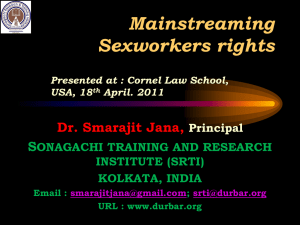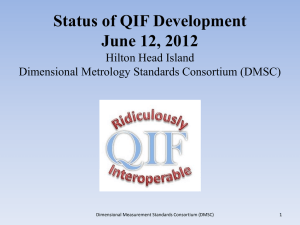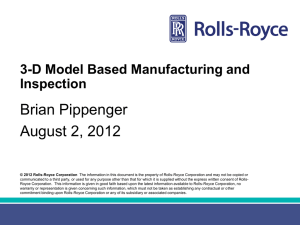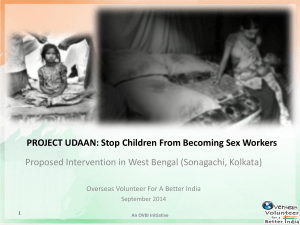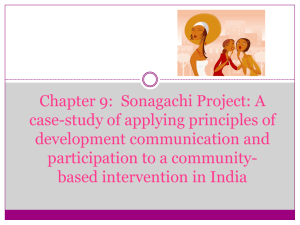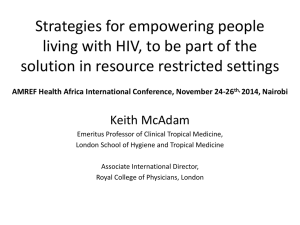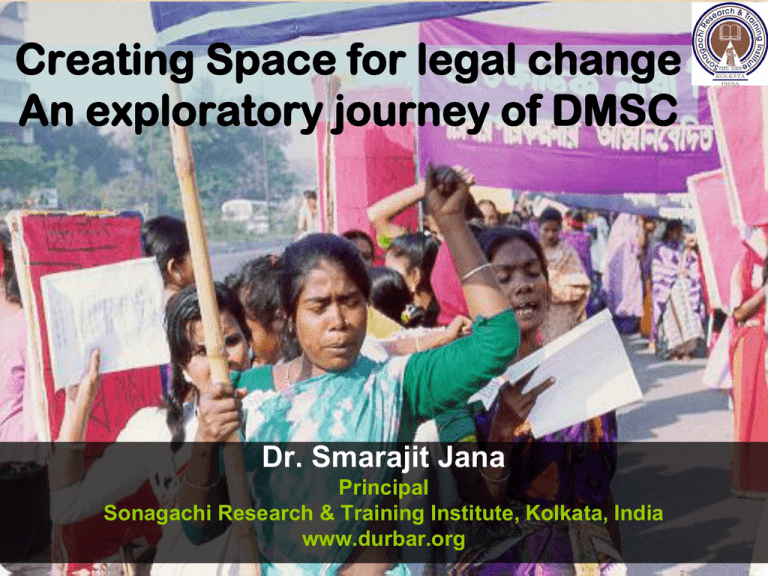
Creating Space for legal change
An exploratory journey of DMSC
Dr. Smarajit Jana
Principal
Sonagachi Research & Training Institute, Kolkata, India
www.durbar.org
Sex Work & Human Rights
The Fact is … (Every hour one or more sex worker is
subjected to verbal or physical abuse somewhere in
India)
1.
However society at large and policy makers in particular are reluctant to
respect basic human Rights including social entitlement of sex- worker;
2.
Violation of Human Rights remained a ‘non issue’ even among the
progressive and liberal – when the victim is a sex worker;
3.
Even juridical redresser mechanism hardly reach out to sex worker
4.
Human rights organization in general has shown very little interest in sex
workers rights related issues.
Sex Work & Human Rights
The Fact is…(policies and practices in India)
Law regulating sex work [ITPA] de
facto criminalizes sex work and
work environment thereby leaving
little room for sex worker to protect
their rights & social entitlement.
Having a criminalized status means
rights are compromised.
Police and administration uses all
possible abusive practices (both as
a protector of law and guardian of
moral code) against sex workerand
in
most
circumstances
practices
are not
necessarily
follow the code of law.
Sex Work & Human Rights
Society at large finds
its ‘moral justification’ in
harassing, beating or
even killing a sex
worker as the common
perception is that they
are involved in
‘immoral act’ by selling
sex services – for
which they need to be
penalised.
Sex Work, Human Rights & HIV
Sex workers’ Rights is
centering around two
interlinked human rights
issues.
Basic Human rights related
to any individual
including Sex Workers
i.e. Human Rights of
Sex Workers. (Indian
official response is
primarily limited to these
rights)
Right to choose an
Occupation as a
Livelihood Option by
any adult individual i.e.
Rights to Self
Determination.
The discourse always exclude
participation of the community…
It is DMSC ,the largest
sex workers collective
representing voices of
60000 sex workers
challenged the
‘unquestionable authority’
of the third party in
deciding their fate…as
early as 1997..when they
hold the first National
conference in Kolkata,
India
The Sex Work collective
raised the issue
who is to decide and on whose
behalf?
Do women in sex work have the
right to decide?
What is the role of a third party in
dictating terms &condition of
consensual sex between two
adults?
Whether transaction of sex –
should be free from money or any
other incentives?
The genesis of DMSC..
As a fall out effect of a
rights based HIV
intervention program
initiated in a large red light
district called Sonagachi,
in city Kolkata, India in
1992…the sex workers
collective in the name of
DMSC came into
existence by 1995..
Sonagachi became a global model for
HIV intervention
The program not only
succeeded in reducing
transmission of HIV and
its sustainable impact
both in the community
as well as in the
general population …
but also has shown
how to make it possible
and what sort of
approaches are crucial
to make a program
successful…
Favourable Impact: Sonagachi experience
STD and ANC prevelence in Kolkata ditrict (2003-2006 )
12
11.25
10
8
Prevalence
6
4.76
2.25
4
2
1.6
0
2003
2004
2005
2006
Years
ANC
STD
Effective community led intervention addressing structural
barriers like politico –legal issues in Kolkata by DMSC has
shown significant contribution in bringing down the ANC
prevalence and STD prevalence in the area.
Avoidable but negative impact:
Mysore Experience
• Police Raid
Down grades the rank of police officers in connection to raids
Reduces the peer contact drastically ( example from Ashodaya Samithi ,
Mysore )
Peer contact reduced with enforcement
action against sex workers
Source: Ashodaya Samithi, Mysore
Increase of HIV in the general population :
Example from Surat
• In 2003 in Surat, Gujarat, the Police evicted 600 sex workers from the Chakla
Bazar brothel area which had been in existence for nearly 500 years
• Health functionaries recorded a fall in condom usage and a rise in the incidence of
STIs and HIV among sex workers since the time of police raids.
• The programme, which had hitherto shown encouraging results, came to an
abrupt end
lessons learnt based on Sonagachi
experience
In addition to service provision
there is a need to create an
enabling environment for
smooth functioning of program
community mobilization and
ownership building is the crucial
element of success..
These principles are now
articulated in Indian National
program subsequently been
incorporated in Bill and Melinda
Gates foundation’s program,
UNAIDS, etc
National HIV Program
included Enabling
Environment &community
ownership
1. Actively support creation of ‘spaces’ for the marginal
communities so that they could actively participate in
articulating their views/and aspirations - within the
program.
2. Ministry of Health has taken partial role [though
sporadically] in addressing macro-level structural issues
e.g. Laws and Policies related to sex-worker and MSM
what affect outcome of intervention program
DMSC strategized their engagement with
different Ministries to broaden the space
National Level advocacy
with the Ministry of health
and WCD to influence the
existing Law ITPA and its
proposed
Amendment
during 2006-2009 which
was successfully thwarted.
Sustained
engagement
with
the
judiciary
in
addressing
eviction of
brothel, police raid and
harassment, victimization
of their children etc
Changing mindset.. To change the Law.
DMSC started recognizing
the fact that there is a need
to..
Challenge the ‘traditional
image’ of sex workers
created over the ages,
Create and to claim
political space to exert the
human agency of sex
workers.
Repositioning the role of
sex workers’ collective in
the society
DMSC’s journey towards dignity
• Regaining self esteem
through articulation of
labor rights
• Playing as a sensible
and responsible citizen
of the country
• DMSC started
reinventing their role
model as a social
reformer and change
maker in the society
Reinforcing collective bargaining power
•DMSC took
proactive role in
collectivizing sex
workers in other
states in India
•Helped to built the
National network of
sex workers[NNSW]
•Took proactive role
in Asia-pacific
network of sex
workers
Influencing the ‘social policy makers’
• Arranging regular interactions with academia
[seminar, workshops in schools, Universities]
• Meeting with intellectuals eg writers, painters, film
directors etc and in drawing their support Interacting
with other members of civil society
• Media advocacy
Advocacy with lawmakers
• Meeting with
Ministers and
Parliamentarians
• Pre poll campaign
targeting aspirant
candidates
• Inviting them to
attend programs
• Arranging field visit
for them
Reaching to general people
• DMSC has developed a mass communication strategy through
organizing open ground festivals called Mela, where people from all
walks of life meet with the sex workers and exchange their views and
enjoy cultural program,
• DMSC so far organized six such program with varying duration [4to 7
days] which are attended by 50000 people on an average
Supporting social causes
• DMSC lend their support to affected communities
in case of natural calamities [Flood, Cyclone,
Drought etc]
• Provide basic services including skill development
for indigenous people [Education, Health]from their
own resources.
• Arrange Health camp, soccer camp for the children
of the urban poor
Expressing social concern
• DMSC held numbers of procession and street
demonstration on issues of national and global
interest eg9/11, invasion of Iraq,Talibanism,
communal violence in Gujrat, child marriage, dowry,
Eve teasing
• DMSC also has raised their voice to protect the
rights of expression of artists, fight against the
framing of cases against social activists
Social &Political activism
• To highlight sex workers
demand DMSC organize
midnight candle light
procession every year on
the eve of May day,
• Celebrate women’s day
• Organized parliament
March during 2006 to stall
the Bill to criminalize clients
• Held several sit in
demonstration to stop
eviction of brothel
Mainstreaming sex workers’ rights agenda
DMSC’s strategy to mainstream their issues with other
labors..
• DMSC is one of the convener of the state level
consortium of unorganized labor
• Sex-workers union has become the member of the
National trade union NTUI
• DMSC is a member of the National campaign
committee representing 450 million unorganized work
force in India
Creating ‘bodies of control’ in partnership…
• DMSC succeeded in creating and institutionalizing
political space through constituting self regulatory Board
…
• To address sex trade related violence including
trafficking
• To establish sex workers rights and ability to keep
control over her life and occupation following a publicprivate partnership model
Impact of SRBs
The proportion of minor (age <18 years) girls in red light areas
shows decline over the period.
Year
1992 1995 1998 2001 2005 2008
% of Girls <18
Years
25.29
21.47
3.56
3.12
2.5
2.15
The median age of sex workers in the red light district
has gone up
Year
1992 1995 1998 2001 2005 2008
Median Age (in
years)
22
22
27
28
28
28
DMSC formulated Sex Workers
demands..
Repeal of ITPA.
Inclusion of Sex Work
in the list of occupation.
Introduction of Self
Regulatory Board to
prevent Violence /
Trafficking in the Sex
Trade.
Strategizing legal intervention
All these effort culminated into legal intervention..
In 2010 DMSC filed cases against couple of clauses of
ITPA
In tandem carrying out advocacy with policy makers
and Mass media
Has strengthen pre poll campaign now going on in the
State of West Bengal
Global pressure to change National Policy
in India
In the recent past the issue of trafficking has given a
new spin …..
There is a conscious effort to equate sex work with
trafficking …… (what essentially triggered from the
view point of ‘moral cleansing' by a section of policy
makers and donors
They try to project women in sex work from a stand
point of “fallen women” who do not have any agency.
The Important Clauses of ITPA and
its implication
• Criminalizes entry into sex
work and categorizes all
sex workers as ‘trafficked
victims’
Section
5A
•
Solicitation of
clients is a
‘ Penal
offence’
Section
5C
Section Section
13 (2)
8 (b)
•Results in arrest
of every person
visiting or, present
in sex work
settings , even
there is no intend
to buy sex
services
•Lowering the rank of
special officer for police
raid will lead to increased ‘
Exploitation by Police’
•Intercepts condoms and
apprehend the peers and
outreach workers
conducting HIV prevention
programme
MILES
TO
GO…
Under these circumstances , strong and sustained
responses evoked all across the country and Policy makers
started feeling the heat
THANK
YOU

